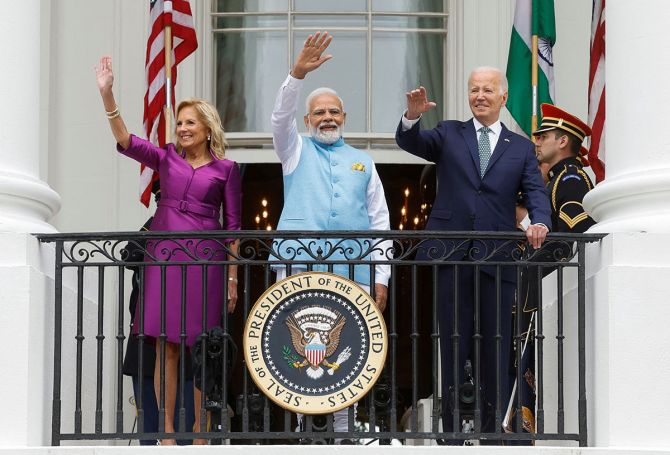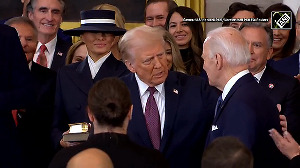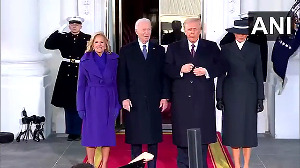Had it not been for the slow but sure emergence of China as a threat to the Western order, would India have been accepted as a near-equal partner by individual Western nations, jointly and severally, questions N Sathiya Moorthy.

It may be just a coincidence, yes, but the way the US has been haranguing India on the human rights front during the nation's parliamentary polls has caused a lot more eyebrows to raise in the country and elsewhere than otherwise.
In particular, NRI bhakts of Prime Minister Narendra D Modi, who claimed that they or their outfits were behind the continuing high tide in bilateral relations, wouldn't know where to hide their faces -- and are silent for most part.
Even those who were critical of Canadian Prime Minister Justin Trudeau over the anti-India turns, developments and decisions of his government, have seemingly been silenced.
The greater coincidence was the China visit of US Secretary of State Antony J Blinken, aimed at trying to 'normalise' bilateral ties for 'global good'.
That the visit came about when the US was going after India on the human rights front did not imply any direct linkage, but this was also the case in the past years.
Hence, questions may be raised about the coincidence, sooner than later.
The question is: Was the US propping up India only because it needed a regional power to check China on the track, before it flew the coop and landed closer to the American 'homeland' or the nation's NATO allies?
After all, European allies of the US had no problem doing business with China, and literally so, until the US convinced them to impose trade and investment sanctions on Beijing.
The net result was that China lost business and investment, but India did not get all of them or even a substantial share of it.
But the US found that an once-enthusiastic India was now slowing down on Quad, Indo-Pacific and all the multilateral arrangements that it had created mainly with New Delhi in mind.
In particular, India's belated refusal to convert Quad into a military alliance -- that however had been the impression all along -- and the more recent defiance of the US diktat on buying oil from Russia, may not have gone down well with an establishment that had not been accustomed to handling such situations, especially when emanating from a friend, who in their eyes used to be a 'prospective member of an emerging NATO'.

It required the collapse of the Soviet Union and the subsequent emergence of China as the anti-West balancer on the global scene that made the US in particular to look around for allies.
India, Japan and South Korea fitted the bill.
Of them, India and Japan had running adversarial issues with China.
Of course, Taiwan was always there but it needed the US to defend itself, and not be America's out-sourcing partner to check 'Chinese expansionism'.
It was like the NATO alliance in the Soviet era. It has since mutated into individual European allies of the US doing their bid to arrest Russia in military and economic terms, without directly joining the Ukraine War.
That may also be because NATO never fought a single war with the Soviet Union.
Nor are they likely to fight a war with China at present.
However, the scene of action now has shifted from cross-Atlantic to the Indo-Pacific. Rather the US scripted the concept far away from its territory.
Whatever that be, suddenly the US found India an attractive strategic partner in these parts first and the rest followed.
It began with de-hyphenating America's India-Pakistan equations, but that was only a beginning.
The greater and faster geo-strategic ties, predicated by bilateral political initiatives, culminating in the Quad, Indo-Pacific, I2U2, all three with India forming a part, was obviously there in the original American script for the post-Cold War world, to be pulled out and developed one after the other.

The question arises: Had it not been for the slow but sure emergence of China as a threat to the Western order, would India have been accepted as a near-equal partner by individual western nations, jointly and severally?
That should include Australia and Japan, if not South Korea.
Would India's concern vis a vis Chinese expansionism become a talking point again for the same reason?
Here again, among India's post-Cold War allies, Japan was the only one to take a guarded position on China's 'Doklam crisis' also involving Bhutan, in 2017.
Looking back, the question arises if China did not expect India to intervene, but for which it could have forced a border resolution on Bhutan.
Those talks are now said to be under way.
Only when Galwan happened in 2020 did the US react strongly and not very long after.
One, it was an occasion for painting China as barbaric.
Two, once the dust had settled down on Doklam earlier, Indian observers had begun pointing to the stunning US silence in the matter.

Talking about India's Kashmir initiatives in a bygone era, External Affairs Minister Subrahmanyam Jaishankar had this to tell the West: 'If you say our people are playing multilateralism, they always did.'
But he added: 'We have grown up.' According to him, 'Multilateralism is a kind of lowest common denominator and anything above that... it will exist side-by-side with national interests, with the calculation and competition of countries.'
Jaishankar asked the West to give more options on the Ukraine War as otherwise they would be pushing the nation into Chinese hands.
He possibly had in mind Russian President Vladimir Putin's last September declaration that the West was pushing Moscow towards China, sounding as if they would prefer not doing it.
Incidentally, China's Xi Jinping talked about Russia ties as a 'strategic option' for his country, months later in December.
In between, you had the European nations reiterating their demand for India to join the anti-Russia camp.
Leave aside the oil deal that has saved India and many other developing nations, these Western worthies seemed to be completely bereft of morals for saying what they have been saying ever since the commencement of the Ukraine War.
But not one of them even remotely remembers then prime minister Indira Gandhi's global diplomacy, seeking their intervention for the sake of Bangladeshi civilians who were brutally raped and burnt and worse, circa 1971.
Not one of them has even extended a word of remorse since.
Elsewhere, Dr Jaishankar had this to say of bilateral ties with Moscow: 'India and Russia have always shared a stable and very friendly relationship.... Russia has never hurt India's interests.'
A strong message this for India's post-Cold War allies, who, whenever it suits them try to throw the human rights rule-book (written by them for others, not themselves) when it suits them, or when they have domestic elections or when they think they can pressure India into submission -- as on the Ukraine War.
Fat hopes!
N Sathiya Moorthy, veteran journalist and author, is a Chennai-based policy analyst and political commentator.
Feature Presentation: Aslam Hunani/Rediff.com











 © 2025
© 2025